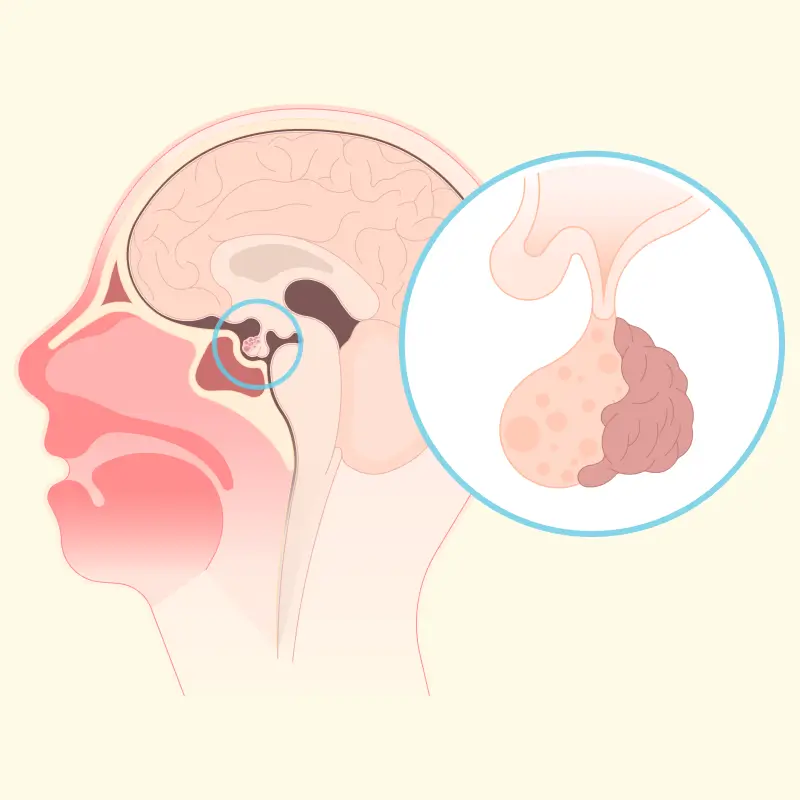
What are pituitary tumors, and how common are they?
Pituitary tumors are growths that develop in the pituitary gland, a small organ which secretes essential hormones and is located behind the nose at the base of the brain. Studies show that pituitary adenomas are increasing in incidence (between 3.9 and 7.4 cases per 100,000 per year) and prevalence (approximately 1 case per 1000 of the general population). They make up approximately 10% of brain tumors. Pituitary tumors can occur in people of any age but they are most often found in older adults aged between 30 and 50
Can pituitary tumors be hereditary, and are there any genetic factors that increase the risk of developing these tumors?
Most people who develop pituitary tumors do not have a family history of the disease. Many people with pituitary tumors have no known risk factors.
However, rarely, pituitary tumors can run in families. When this happens, they are often found as part of a genetic syndrome that may involve other types of tumors as well.
Like multiple endocrine neoplasias (MEN syndrome)
What are the typical symptoms of a pituitary tumor ?
- Symptoms may result from pressure on the brain or nearby structures.
- Common symptoms include headaches, vision changes, hormonal imbalances, and fatigue
How do pituitary tumors affect hormone levels in the body, and what are the long-term effects of hormonal imbalances caused by these tumors?
Pituitary tumors are of two types Functioning and non-functioning tumors
- Functioning tumors: They secrete excess level of hormones. Symptoms depend on which hormone is in excess. Tumors which secrete excess growth hormone can cause changes in facial features such as enlargement of nose, thickening of lips, enlarged hands and feet. Tumors which lead to excess cortisol production (also called Cushing’s syndrome) can lead to obesity, Diabetes, Hypertension, decreased immunity. Tumors producing excess prolactin can cause menstrual irregularities, failure to conceive and have children in women.
- Nonfunctioning tumors: They reduce the levels of hormones like thyroid hormones, cortisol, growth hormone by pressing on normal pituitary gland. causing problems like fatigue, weight problems and menstrual irregularities.
How are pituitary tumors diagnosed, and what tests are typically used for diagnosis?
Pituitary tumors are diagnosed through a combination of medical history, physical examination, and various tests
1. History and Physical Exam
- Doctor will discuss in detail the symptoms the patient is suffering from along with personal and family medical history.
- A thorough physical examination helps identify any signs or symptoms related to pituitary tumors which the patient might not have noticed
2. Blood Tests
- Blood tests assess hormone levels.
- Elevated or reduced hormone levels may indicate a pituitary adenoma.
3. MRI Scan
- (Magnetic Resonance Imaging) provides detailed images of the brain and detects pituitary tumors,
- Reveals their location, and assesses their size.They are Preferred over CT scans for pituitary tumor diagnosis.
4. Vision Testing:
- Pituitary tumors can affect eyesight, especially peripheral vision which the patient may not realize.
- So, specialized visual tests like visual perimetry can help in picking up vision problems.
5. Endocrinologist consultation may be required to treat the hormonal imbalance caused due to pituitary tumors.
Remember: early detection and accurate diagnosis are crucial for effective management of pituitary tumors
What are the treatment options available for pituitary tumors, and how do you determine the most suitable treatment for a patient?
Pituitary tumors can be managed through various treatment options based on factors such as tumor type, size, location, and growth.
Let's explore these options:
Surgery:
Endoscopic Trans nasal Transsphenoidal Surgery
- It is the Preferred approach for most pituitary tumors.
- The tumor is removed by introducing an endoscope through the nose without external incisions.
Craniotomy
- This is Reserved for specific cases.
- The tumor is removed through an opening in the skull.
- Surgery aims to remove the tumor , relieve pressure on nearby structures and improve symptoms.
Medical Therapy
- Medical therapy as first line treatment is usually reserved for functioning pituitary tumors especially prolactin secreting tumors. These shrink the size of tumor and reverse the hormone imbalances.
In other tumors it is used as second line treatment after surgery to treat the residual tumor left behind after surgery.
Radiation Therapy
- Gamma Knife or Stereotactic Radiosurgery is the specialized form of radiation therapy where Precise radiation beams target the tumor. This is used when surgery is not feasible or as an adjunct to surgery. It Controls tumor growth.
What are the potential risks and complications associated with pituitary tumor surgery?
It is a safe surgery. Some complications specific to pituitary surgery include cerebrospinal fluid leakage through the nose, hormonal alterations, damage to the normal functioning pituitary gland, vision loss, meningitis, and bleeding.
Can pituitary tumors recur after treatment, and if so, what is the likelihood of recurrence?
They are generally benign tumors and do not recur if we remove the whole tumor completely or give early radiosurgery for those patients who have residual tumors. Recurrence rate is 10% and certain factors like residual tumor, growth of tumor to surrounding areas, younger age, high pre-op hormone levels, have higher rates of recurrence
Are there any lifestyle changes or preventive measures that individuals with pituitary tumors should consider?
Pituitary tumors are not a lifestyle related disease and after a successful tumor removal or cure through medical treatment patients with pituitary tumors can go back to a normal lifestyle, however they have to remain on close monitoring with regular visits to the treating surgeon and endocrinologist and some of the patients would need to be on hormone supplements.
If the pituitary tumors are detected early there is no reason why patient cannot need a normal life after treatment. Anyone with hormonal issues, unexplained headache, vision problems or a combination of these symptoms should promptly consult an endocrinologist/ eye specialist / neurosurgeon for early diagnosis of pituitary tumors.

